Late existentialist writer Franz Kafka turned Gregor Samsa, the main character in his 1915 novella The Metamorphosis into a monstrous insect. Nearly a century later, Taiwanese theater veteran Wu Hsing-kuo (吳興國) becomes the bug, as well as a bird and all the female characters in Kafka’s story.
Metamorphosis (蛻變), a recent production of Wu’s Contemporary Legend Theater (當代傳奇劇場) that premiered earlier this year at UK’s Edinburgh International Festival, sees the actor-dramatist in a solo performance.
Fusing traditions of the East and West has always been Wu’s forte. The troupe’s repertoire comprises adapted European classics such as The Tempest and Macbeth by Shakespeare and a number of Greek tragedies including Medea and The Oresteia, among other works based on modern literature and traditional Beijing opera.
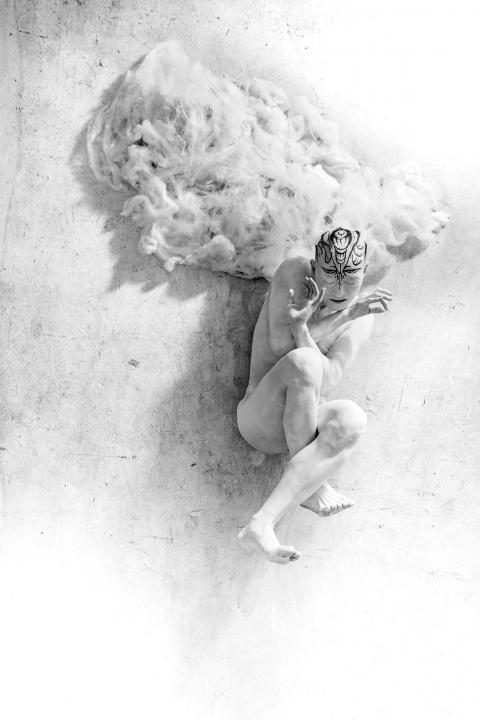
Photo courtesy of Contemporary Legend Theater
In King Lear, Wu carried out a solo tour-de-force, depicting multiple characters simultaneously and wowing sold out theaters worldwide. He will perform the same physically and emotionally-demanding act in Metamorphosis, in which he morphs from a man to a bug, to a woman and a bird. The show returns to Taiwan’s National Theater in December.
KAFKA AND WOMEN
Wu said at a recent press event that he read many of Kafka’s novels — not just The Metamorphosis — to learn more about him. He found the most inspiration in Kafka’s love letters.
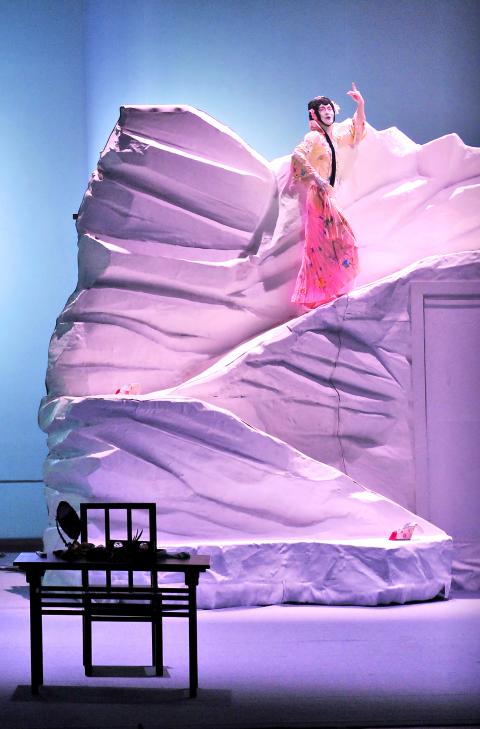
Photo courtesy of Contemporary Legend Theater
“I saw who Kafka really was from the love letters he wrote to his girlfriends, where he revealed a more sensitive personality,” Wu said.
Wu examines this other face of Kafka in Love, one of the six scenes that make up Metamorphosis, where he changes into a woman.
“In the novels, Kafka gives us a strong character. In his love letters, however, we see how he perceives women, the tone he uses to speak with women … It shows another side of him. It is a pity if I leave that out of my play,” Wu told the Taipei Times.
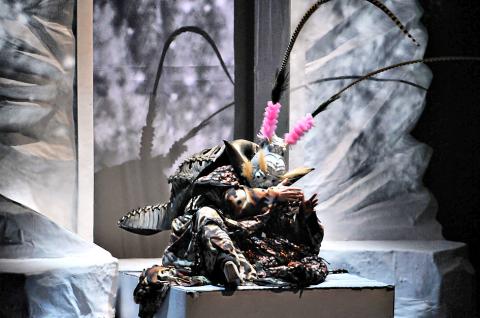
Photo courtesy of Contemporary Legend Theater
In Love, Wu wears a rosy two-piece traditional Chinese dress with floral print and full make-up, fitting his feet into a pair of 3-inch stilts to achieve a feminine look.
Wu said that imitating a woman and a bug are equally challenging. “As you know, the bug in Kafka’s book has nothing to do with any natural insect. It is a monster created by a human. After brainstorming with Lai Hsuen-wu (賴宣吾), we remodeled the Kao (靠) — a kind of armor in Beijing opera — to build the costume,” he added. Lai, as the show’s costume designer, planned several striking looks for Wu, including one that requires Wu to sing in a white and tight-fitting bodysuit with a face inked on his forehead.
Although it is an adaptation, Metamorphosis follows no linear storyline or plot. Wu called the scenes his “six dreams,” in which he delivers Kafka’s thinking in Eastern-style theatrical language and sings the lyrics written by author Chang Da-chun (張大春), adding a surreal dimension to the original narration.
Wu believes that reinventing tradition and innovating are the responsibility of today’s artists.
“[You] cross disciplines and mix match different genres until the boundaries blur, until you can’t really tell what’s Eastern and Western anymore,” he said.

Many people noticed the flood of pro-China propaganda across a number of venues in recent weeks that looks like a coordinated assault on US Taiwan policy. It does look like an effort intended to influence the US before the meeting between US President Donald Trump and Chinese dictator Xi Jinping (習近平) over the weekend. Jennifer Kavanagh’s piece in the New York Times in September appears to be the opening strike of the current campaign. She followed up last week in the Lowy Interpreter, blaming the US for causing the PRC to escalate in the Philippines and Taiwan, saying that as
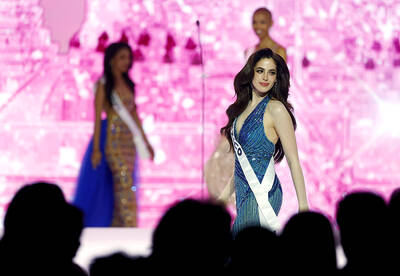
This year’s Miss Universe in Thailand has been marred by ugly drama, with allegations of an insult to a beauty queen’s intellect, a walkout by pageant contestants and a tearful tantrum by the host. More than 120 women from across the world have gathered in Thailand, vying to be crowned Miss Universe in a contest considered one of the “big four” of global beauty pageants. But the runup has been dominated by the off-stage antics of the coiffed contestants and their Thai hosts, escalating into a feminist firestorm drawing the attention of Mexico’s president. On Tuesday, Mexican delegate Fatima Bosch staged a
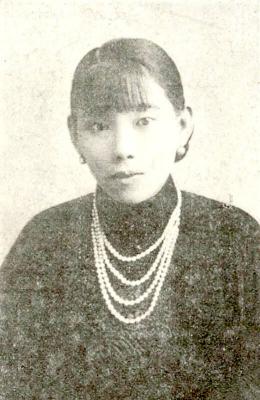
Nov. 3 to Nov. 9 In 1925, 18-year-old Huang Chin-chuan (黃金川) penned the following words: “When will the day of women’s equal rights arrive, so that my talents won’t drift away in the eastern stream?” These were the closing lines to her poem “Female Student” (女學生), which expressed her unwillingness to be confined to traditional female roles and her desire to study and explore the world. Born to a wealthy family on Nov. 5, 1907, Huang was able to study in Japan — a rare privilege for women in her time — and even made a name for herself in the

Taiwan can often feel woefully behind on global trends, from fashion to food, and influences can sometimes feel like the last on the metaphorical bandwagon. In the West, suddenly every burger is being smashed and honey has become “hot” and we’re all drinking orange wine. But it took a good while for a smash burger in Taipei to come across my radar. For the uninitiated, a smash burger is, well, a normal burger patty but smashed flat. Originally, I didn’t understand. Surely the best part of a burger is the thick patty with all the juiciness of the beef, the